The Economics of a ‘Rabbit Cage’
As we walk on land ripe with eggplant and cucumbers, we can see the Israeli cities of Ashkelon and Sderot. The farm is so close to those communities that family members use an Israeli telecommunications company to get Internet access. But the family can’t export its crops.Since Hamas won Palestinian elections in Gaza in 2006, Israel has imposed an economic embargo, severely restricting imports and exports.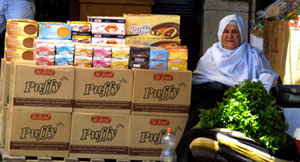
BEIT LAHIA, Gaza Strip — From his house just half a mile from the Israeli border, farmer Ahmad Shafi can sometimes see homemade Palestinian rockets streaking toward Israel. Despite his strong opposition to the firing of those rockets, his house has been shelled in retaliation by the Israeli military.
As we walk on his land ripe with eggplant and cucumbers, we can see the Israeli cities of Ashkelon and Sderot. The farm is so close to those communities that Shafi’s family members use an Israeli telecommunications company to get Internet access. But the family can’t export its crops.
Since Hamas won Palestinian elections in Gaza in 2006, Israel has imposed an economic embargo, severely restricting imports and exports. Israel says the sanctions put pressure on Gaza’s ruling party, Hamas, and help deter rocket attacks on Israeli civilians.
But Shafi calls the blockade a form of collective punishment. No one in Shafi’s family voted for Hamas in the last elections, but they and every other Gazan suffer from the blockade.
“We live in a large rabbit cage,” he tells me as we walk back to his home for an evening meal.
Last month, for the first time in five years, Egypt opened the Rafah Gate crossing into Gaza. Shafi had hoped the opening would help soften the effects of the Israeli blockade, but he was disappointed because only people can cross, not commercial trade.
“Economically it doesn’t help that much,” he tells me. “But for sure it will help the Palestinians because it opens Gaza to the outside world.”
Israeli officials argue that opening the Egyptian border to normal trade would facilitate arms smuggling. So far, they have successfully pressured Egypt’s interim military government to prohibit normal commerce.
|
© 2011 Reese Erlich Near Ahmad Shafi’s farm, militants sometimes fire rockets into Israel, and Shafi’s property has been hit with Israeli artillery shells. |
To get around the Israeli blockade, entrepreneurial Gazans built tunnels into Egypt, smuggling in everything from wheat flour to disassembled cars.
A taxi driver takes me to the city of Rafah in the far south of the Gaza Strip. We see a wall with an Egyptian flag waving atop a guard tower. There’s a few hundred feet of empty, sandy desert. Then, on the Gaza side, we see lots of metal scaffolding covered with plastic, what looks like tomato hothouses.
In reality, the plastic tarps shade tunnel entrances. I was surprised that the entrances were so easily identifiable. We see no hidden entrances from buildings or even camouflage to help prevent Israeli airstrikes.
The Israeli military argues that the tunnel operators smuggle arms in from Egypt, and therefore Israel periodically bombs the tunnels. They quickly reopen, however, because workers have already dug alternative routes.
Abu Omar, his preferred pseudonym, shows me the winch used to lower a rope into a 50-foot-deep tunnel entrance. He operates a tunnel that used to bring smuggled consumer goods from Egypt to Gaza every day.
“We’re down to operating about one or two shipments a month,” Abu Omar tells me. “Now people bring their own goods across through Rafah Gate.”
Other tunnel men, however, continue their thriving business importing gasoline and building supplies. Many goods remain scarce and expensive, but the blockade has eased somewhat over the past year.
On May 31, 2010, a flotilla of passenger boats from Turkey tried to bring supplies into Gaza. Nine people traveling in the flotilla were killed and many were injured in fighting when Israeli commandos boarded.
The resulting international outcry put pressure on Israel. Today, cement and construction materials are allowed to enter Gaza, but only for U.N.-approved projects. More food can be imported, and even a few new cars. Flowers and strawberries can be exported, but in very limited quantities.
Economy Minister Allaa El-Rafati tells me Palestinians have been unable to export most products or get raw materials for their factories.
“Even before the siege, Israel imposed many restrictions on our exports,” says El-Rafati. “We always had to work through specific Israeli exporting companies, which controlled everything, including prices. Before the siege, we had $250 million in exports of flowers and strawberries. Now, all of our exports total less than $2 million per year.”
Unemployment in Gaza is at 45 percent, according to a recent United Nations Relief and Works Agency report.
Back at his farm, Ahmad Shafi tells me he wants peace between Israelis and Palestinians. He strongly opposes those who launch rockets into Israel.
“It causes a lot of trouble for us as farmers,” he says. “It corrupts the relationship between Israel and us. Life stops. They have the right to live, and we have the right to live.”
Shafi says the Israelis and the Palestinians each will have to recognize the right of the other to exist in an independent nation. “We are neighbors. We are on the same land. You [the Israelis] have the right to live here and so do we.”
Shafi says ending the economic sanctions on Gaza would be a good first step toward peace. But Israel shows no signs of lifting the blockade, and it appears unlikely that normal trade with Egypt will be allowed anytime soon.
Egypt has scheduled parliamentary elections for September, and Gazans hope a new government there will fully open the Rafah Gate. For Palestinians, such hope springs eternal.
Veteran foreign correspondent Reese Erlich has covered the Middle East for 25 years. His reports from Egypt and Gaza are funded by the Pulitzer Center on Crisis Reporting. Follow his blogs and read his other stories at the Pulitzer center’s website.
Your support matters…Independent journalism is under threat and overshadowed by heavily funded mainstream media.
You can help level the playing field. Become a member.
Your tax-deductible contribution keeps us digging beneath the headlines to give you thought-provoking, investigative reporting and analysis that unearths what's really happening- without compromise.
Give today to support our courageous, independent journalists.
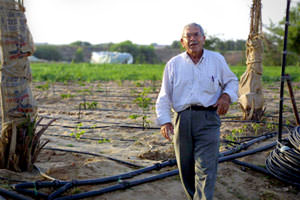
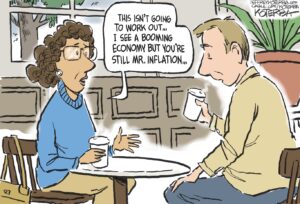


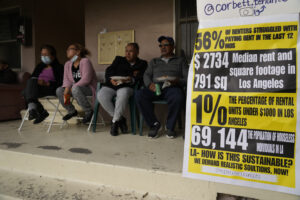

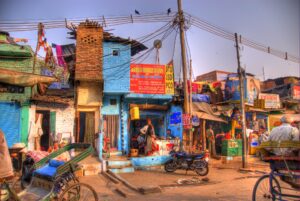
You need to be a supporter to comment.
There are currently no responses to this article.
Be the first to respond.